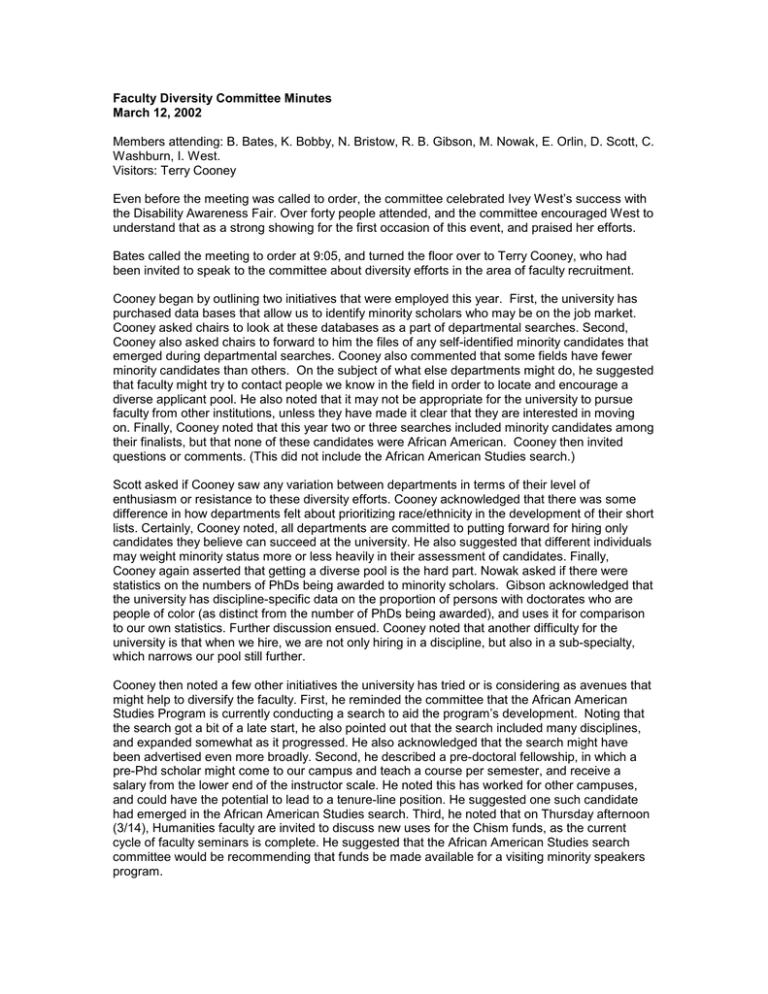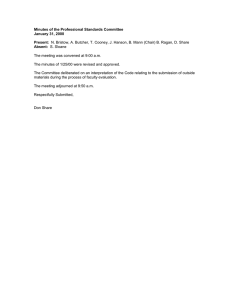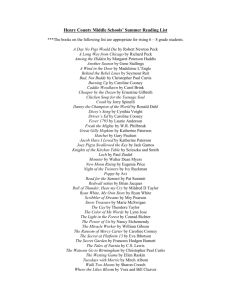Document 12289874
advertisement

Faculty Diversity Committee Minutes March 12, 2002 Members attending: B. Bates, K. Bobby, N. Bristow, R. B. Gibson, M. Nowak, E. Orlin, D. Scott, C. Washburn, I. West. Visitors: Terry Cooney Even before the meeting was called to order, the committee celebrated Ivey West’s success with the Disability Awareness Fair. Over forty people attended, and the committee encouraged West to understand that as a strong showing for the first occasion of this event, and praised her efforts. Bates called the meeting to order at 9:05, and turned the floor over to Terry Cooney, who had been invited to speak to the committee about diversity efforts in the area of faculty recruitment. Cooney began by outlining two initiatives that were employed this year. First, the university has purchased data bases that allow us to identify minority scholars who may be on the job market. Cooney asked chairs to look at these databases as a part of departmental searches. Second, Cooney also asked chairs to forward to him the files of any self-identified minority candidates that emerged during departmental searches. Cooney also commented that some fields have fewer minority candidates than others. On the subject of what else departments might do, he suggested that faculty might try to contact people we know in the field in order to locate and encourage a diverse applicant pool. He also noted that it may not be appropriate for the university to pursue faculty from other institutions, unless they have made it clear that they are interested in moving on. Finally, Cooney noted that this year two or three searches included minority candidates among their finalists, but that none of these candidates were African American. Cooney then invited questions or comments. (This did not include the African American Studies search.) Scott asked if Cooney saw any variation between departments in terms of their level of enthusiasm or resistance to these diversity efforts. Cooney acknowledged that there was some difference in how departments felt about prioritizing race/ethnicity in the development of their short lists. Certainly, Cooney noted, all departments are committed to putting forward for hiring only candidates they believe can succeed at the university. He also suggested that different individuals may weight minority status more or less heavily in their assessment of candidates. Finally, Cooney again asserted that getting a diverse pool is the hard part. Nowak asked if there were statistics on the numbers of PhDs being awarded to minority scholars. Gibson acknowledged that the university has discipline-specific data on the proportion of persons with doctorates who are people of color (as distinct from the number of PhDs being awarded), and uses it for comparison to our own statistics. Further discussion ensued. Cooney noted that another difficulty for the university is that when we hire, we are not only hiring in a discipline, but also in a sub-specialty, which narrows our pool still further. Cooney then noted a few other initiatives the university has tried or is considering as avenues that might help to diversify the faculty. First, he reminded the committee that the African American Studies Program is currently conducting a search to aid the program’s development. Noting that the search got a bit of a late start, he also pointed out that the search included many disciplines, and expanded somewhat as it progressed. He also acknowledged that the search might have been advertised even more broadly. Second, he described a pre-doctoral fellowship, in which a pre-Phd scholar might come to our campus and teach a course per semester, and receive a salary from the lower end of the instructor scale. He noted this has worked for other campuses, and could have the potential to lead to a tenure-line position. He suggested one such candidate had emerged in the African American Studies search. Third, he noted that on Thursday afternoon (3/14), Humanities faculty are invited to discuss new uses for the Chism funds, as the current cycle of faculty seminars is complete. He suggested that the African American Studies search committee would be recommending that funds be made available for a visiting minority speakers program. Bates asked if difficulties with hiring a diverse faculty reached across campuses nationwide, and Cooney acknowledged that there is variation, and spoke directly to the particular problem of our location, which can prove a disadvantage in efforts to hire African American faculty. Scott asked if the administration had considered the possibility of having departments propose a position, which they would receive if they were able to hire a minority faculty member. Cooney suggested that there are potentially legal problems with this kind of approach. Nowak asked if we are being creative in how we look at candidates, as we have been with students, for instance looking at qualities such as first-generation to college. Cooney suggested this might not work in the same way with faculty hiring and that we could not launch a series of inquiries about family background and economic circumstance as a legitimate part of faculty searches. Washburn asked what role a candidate’s undergraduate institution plays in the hiring process, noting that many first-generation students attend state institutions. Cooney ran through the hiring process as it operates, and suggested that he was not sure we can trace this role easily. He suggested that it may play a role most importantly as individuals are able to articulate liberal arts values due to some kind of liberal arts institution experience. Gibson wondered if in the early stage of narrowing whether any conscious or unconscious bias in favor of liberal arts educations operated. Cooney returned to the university’s concern that only those who will prove successful be hired, and argued that given the range of expectations we have, many candidates of all backgrounds are not prepared to succeed here, some because the elite nature of their educations has narrowed their expectations of what they will teach. Orlin asked if it would be possible to identify available scholars, and create positions for them, and wondered if this solved the legal issues. Cooney suggested this could be a possibility, but reminded the committee that the key issue is fairness, and wondered whether a process of this sort resorts to the traditional “old boys network” version of hiring. Cooney then suggested that the bigger issue for the university is the absence of flexibility in the availability of tenure-lines. Washburn returned to the issue of experience in a liberal arts setting, and wondered if we might look to one-year positions as a means to diversify our faculty, and at the same time offer younger scholars the opportunity to gain experience at a liberal arts institution. Cooney suggested that African American scholars are often hired earlier in their careers, and may be less likely to be interested in a one-year job. He also noted that the issue of experience at a liberal arts institution has not been a factor with recent candidates of color. Rather, he noted that sometimes minority candidates turn us down. Bristow asked about the possibilities of a visiting scholar program. Cooney suggested this might be possible, but that we would likely need to focus our efforts on younger rather than senior scholars. In closing, Cooney suggested that he welcomes any suggestions faculty might have about efforts to diversify the faculty. Following a very brief discussion of assorted committee logistics, the meeting adjourned at 9:55. Respectfully submitted, Nancy K. Bristow History Department

